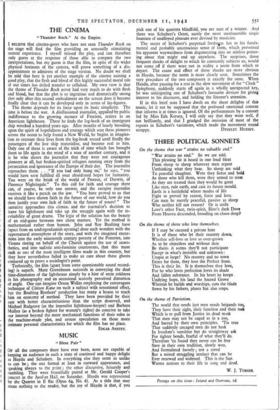"Thunder Rock." At the Empire.
THE CINEMA
I BELIEVE that cinema-goers who have not seen Thunder Rock on the stage will find the film providing an unusually stimulating
mental experience. I myself missed the play, and can therefore only guess at the response of those able to compare the two interpretations, but my guess is that the film, in spite of the wider physical horizons of the camera, will prove something of a dis- appointment to admirers of the stage version. No doubt we shall be told that here is yet another example of the cinema ruining a good play, that the flesh and blood of this highly successful moral tale of our times has defied transfer to celluloid. My own view is that the theme of Thunder Rock never had very much to do with flesh and blood, but that the plot is so ingenious and dramatically strong that only after this second embodiment on the screen does it become finally clear that it can be developed only in terms of lay-figures.
The theme depends for its force upon its basic simplicity. The time is before the war. A disillusioned journalist, appalled by public indifference to the growing menace of Fascism, retires to an American lighthouse. There he finds the log-book of an immigrant ship wrecked a hundred years ago. After months of lonely brooding upon the spirit of hopefulness and courage which sent these pioneers across the ocean to help found a New World, he begins in imagina- tion to recreate their lives from the log-book record until finally the passengers of the lost- ship materialise, and become real to him. Only one of them is aware of the trick of time which has brought them to life again in the mind of a man of another century, and it is he who shows the journalist that they were not courageous pioneers at all, but broken-spirited refugees running away from the persecution and ignorance of the Europe of their day. The journalist reproaches them. . . ." If you had only hung on," he says, "you would have seen fulfilled all your abandoned hopes for humanity. You were on the brink of the world of Pasteur, of Darwin, of Florence Nightingale." To this call for faith and courage there can, of course, be only one answer, and the escapist journalist receives it like a punch on the jaw. "You have proved to us that we should have shown faith in the future of our world, how do you then justify your own lack of faith in the future of yours?" The aarrative approaches this climax. and the journalist's decision to leave his lighthouse and take up the struggle again with the in- evitability of great drama. The logic of the solution has the beauty of an end-game between two chess masters. Yet the method is mathematical rather than human. John and Roy Boulting have (apart from an undergraduatish opening) done such wonders with the supernatural atmosphere of the story, and with the imagined excur- sions into the early nineteenth century poverty of the Potteries, into Vienna rioting on behalf of the Church against the use of anaes- thetics, and into sadistic anti-feminist courtrooms, that this 'must rank as one of the most intelligent films made in this country, but they have nevertheless failed to make us care about these ghosts conjured up to prove a sociologist's point.
Technically, the film (apart from some questionable sound record- ing) is superb. Mutz Greenbaum succeeds in conveying the dual time-dimension of the lighthouse simply by a hint of eerie coldness in his photography and an occasional scarcely perceived distortion of angle. One can imagine Orson Welles employing the extravagant technique. of Citizen Kane on such a subject with sensational effect, but the Boulting Brothers' production has many a lesson to teach him on economy of method. They have been provided by their cast with better characterisations than the script deserved, and Michael Redgrave (as the journalist lighthouse-keeper) and Barbara Mullen (as a broken fighter for women's rights) do contrive to take our interest beyond the mere mechanical functions of their roles in the machine-made plot, and arouse speculation on those more intimate personal characteristics for which the film has no place.
EDGAR ANSTEY.


























 Previous page
Previous page